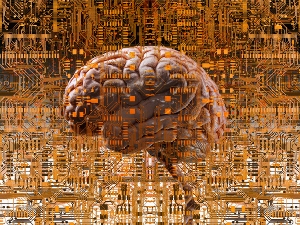



Date:29/10/16
 Researchers from the Google Brain deep learning project have already taught AI systems to make trippy works of art, but now they're moving on to something potentially darker: AI-generated, human-independent encryption. According to a new research paper, Googlers Martín Abadi and David G. Andersen have willingly allowed three test subjects -- neural networks named Alice, Bob and Eve -- to pass each other notes using an encryption method they created themselves.
Researchers from the Google Brain deep learning project have already taught AI systems to make trippy works of art, but now they're moving on to something potentially darker: AI-generated, human-independent encryption. According to a new research paper, Googlers Martín Abadi and David G. Andersen have willingly allowed three test subjects -- neural networks named Alice, Bob and Eve -- to pass each other notes using an encryption method they created themselves.
As the New Scientist reports, Abadi and Andersen assigned each AI a task: Alice had to send a secret message that only Bob could read, while Eve would try to figure out how to eavesdrop and decode the message herself. The experiment started with a plain-text message that Alice converted into unreadable gibberish, which Bob could decode using cipher key. At first, Alice and Bob were apparently bad at hiding their secrets, but over the course of 15,000 attempts Alice worked out her own encryption strategy and Bob simultaneously figured out how to decrypt it. The message was only 16 bits long, with each bit being a 1 or a 0, so the fact that Eve was only able to guess half of the bits in the message means she was basically just flipping a coin or guessing at random.
Of course, the personification of these three neural networks oversimplifies things a little bit: Because of the way the machine learning works, even the researchers don't know what kind of encryption method Alice devised, so it won't be very useful in any practical applications. In the end, it's an interesting exercise, but we don't have to worry about the machines talking behind our backs just yet. With open-source deep learning tools like Microsoft's Cognitive Toolkit, it might be interesting to see this play out on an even larger scale.
Google's neural network learns to encrypt its own messages
 Researchers from the Google Brain deep learning project have already taught AI systems to make trippy works of art, but now they're moving on to something potentially darker: AI-generated, human-independent encryption. According to a new research paper, Googlers Martín Abadi and David G. Andersen have willingly allowed three test subjects -- neural networks named Alice, Bob and Eve -- to pass each other notes using an encryption method they created themselves.
Researchers from the Google Brain deep learning project have already taught AI systems to make trippy works of art, but now they're moving on to something potentially darker: AI-generated, human-independent encryption. According to a new research paper, Googlers Martín Abadi and David G. Andersen have willingly allowed three test subjects -- neural networks named Alice, Bob and Eve -- to pass each other notes using an encryption method they created themselves.As the New Scientist reports, Abadi and Andersen assigned each AI a task: Alice had to send a secret message that only Bob could read, while Eve would try to figure out how to eavesdrop and decode the message herself. The experiment started with a plain-text message that Alice converted into unreadable gibberish, which Bob could decode using cipher key. At first, Alice and Bob were apparently bad at hiding their secrets, but over the course of 15,000 attempts Alice worked out her own encryption strategy and Bob simultaneously figured out how to decrypt it. The message was only 16 bits long, with each bit being a 1 or a 0, so the fact that Eve was only able to guess half of the bits in the message means she was basically just flipping a coin or guessing at random.
Of course, the personification of these three neural networks oversimplifies things a little bit: Because of the way the machine learning works, even the researchers don't know what kind of encryption method Alice devised, so it won't be very useful in any practical applications. In the end, it's an interesting exercise, but we don't have to worry about the machines talking behind our backs just yet. With open-source deep learning tools like Microsoft's Cognitive Toolkit, it might be interesting to see this play out on an even larger scale.
Views: 474
©ictnews.az. All rights reserved.Similar news
- Azerbaijani project to monitor disease via mobile phones
- Innovative educational system to be improved under presidential decree
- NTRC prolongs license of two TV and radio organizations for 6 years
- Azerbaijan establishes e-registry for medicines
- Azerbaijani museum introduces e-guide
- Nar Mobile opens “Nar Dunyasi” sales and service center in Siyazan city
- International conference on custom electronic services held in Baku
- OIC secretary general to attend COMSTECH meeting in Baku
- Azerbaijan develops earthquake warning system
- New law to regulate transition to digital broadcasting in Azerbaijan
- Azerbaijani State Social Protection Fund introduces electronic digital signature
- Intellectual traffic management system in Baku to be commissioned in December
- Tax Ministry of Azerbaijan started receiving video-addresses
- World Bank recommends Azerbaijan to speed up e-service introduction in real estate
- Azerbaijan to shift to electronic registration of real estate





















